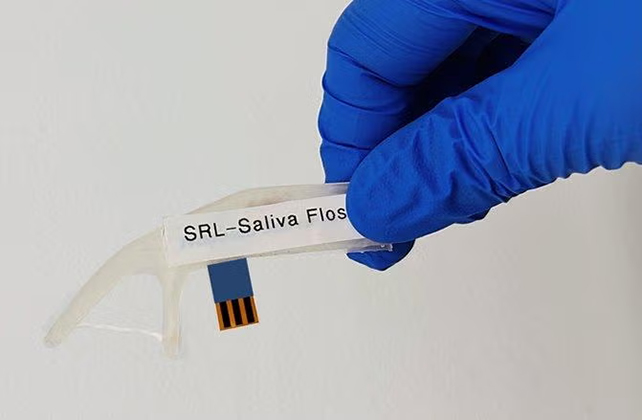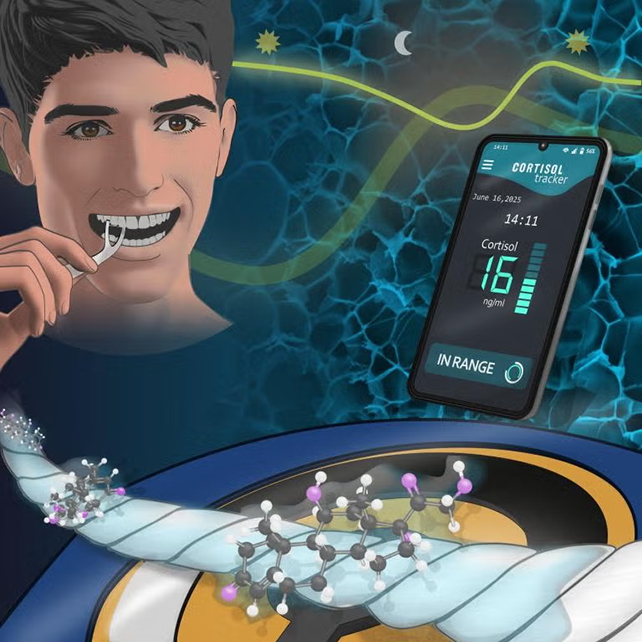We know that flossing is generally good for our oral health, but researchers from Tufts University in the United States have gone one step further, developing smart floss that monitors your stress levels as well as keeping your teeth and gums clean.
It works through the use of a narrow channel in the floss, which draws in saliva. The saliva is then passed over electrodes attached to the floss, before being analyzed by a built-in sensor, with readings transmitted to a phone app.
"We didn't want measurement to create an additional source of stress, so we thought, can we make a sensing device that becomes part of your day-to-day routine?" says electrical and computer engineer Sameer Sonkusale, from Tufts University.
"Cortisol is a stress marker found in saliva, so flossing seemed like a natural fit to take a daily sample."
The smart floss addresses one of the main problems with tracking stress: it's not all that easy to measure properly, with self-reporting and psychological tests susceptible to bias, and current cortisol analysis relying on blood samples and lab work.
A smart floss approach would be quicker, more convenient, and easier to fit into a daily routine. There's plenty of work still to do – this prototype was tested using a lab setup, not by people actually flossing – but there's definitely potential here.
 The prototype device developed by researchers. (Atul Sharma/Nafize Ishtiaque Hossain)
The prototype device developed by researchers. (Atul Sharma/Nafize Ishtiaque Hossain)Key to the invention is a material called eMIP (or electropolymerized molecularly imprinted polymer) that enables the device to recognize cortisol. It's a bit like a microscopic plaster cast, made to fit a specific shape – in this case, the shape of cortisol molecules.
The eMIP massively cuts down on the work and expense normally required to develop a biosensor like this. What's more, it was shown to be very accurate in tests – the researchers found it was as good as any other current sensor at detecting cortisol levels.
"eMIP does not rely on a lot of investment in making antibodies or receptors," says Sonkusale. "If you discover a new marker for stress or any other disease or condition, you can just create a polymer cast in a very short period of time."
This means the system can be easily adapted to detect other biological markers too, like tracking hormone levels for fertility or glucose levels to monitor diabetes.
 Cortisol readings could be transmitted to a smartphone app. (Nafize Ishtiaque Hossain)
Cortisol readings could be transmitted to a smartphone app. (Nafize Ishtiaque Hossain)While most of us will come under stresses and strains of some type or other during the day, chronic, long-term stress is a significant health issue. It can often increase the risk of other serious conditions, including cardiovascular disease and high blood pressure. It's also linked to mental health problems, including anxiety and depression.
However, the researchers do note some limitations in their device, aside from it being early in its development. They see the smart floss as being of most use in monitoring a health condition rather than diagnosing it in the first place – not least because saliva biomarkers can vary between individuals.
"For diagnostics, blood is still the gold standard," says Sonkusale.
"Once you are diagnosed and put on medication, if you need to track, say, a cardiovascular condition over time to see if your heart health is improving, then monitoring with the sensor can be easy and allows for timely interventions when needed."
The research has been published in ACS Applied Materials & Interfaces.

.jpg) 6 hours ago
1
6 hours ago
1
 English (US)
English (US)